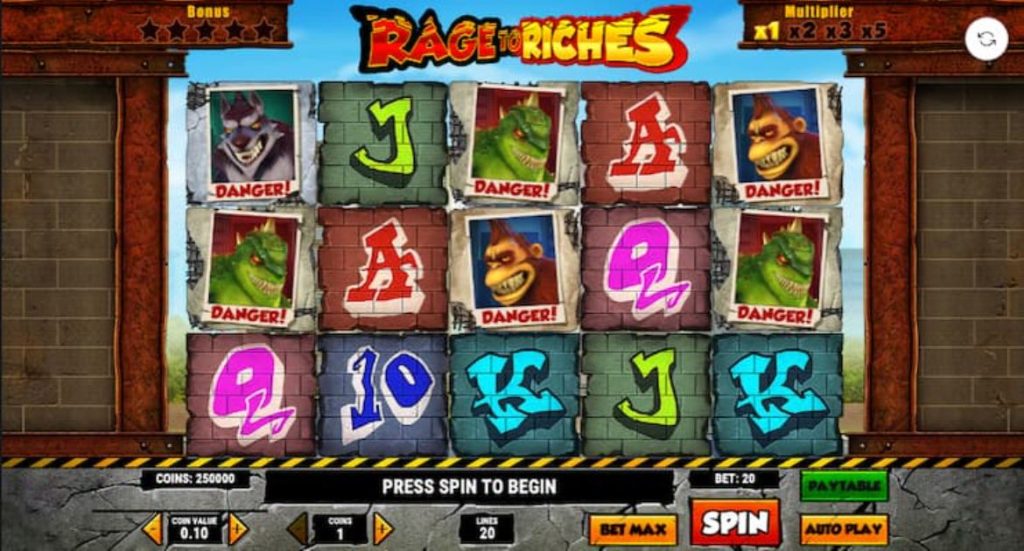Until recently, the concept of crypto casinos was relatively niche, but today, they’ve revolutionized the online gambling scene. These crypto and Bitcoin casinos have become a favorite among players for their speed, privacy, and innovation.
With countless options available, picking the best crypto casinos can be a daunting task. That’s where we come in. We’ve carefully reviewed a list of standout Bitcoin casinos, offering everything from exciting online casino games to unbeatable bonuses. We’ll explain our evaluation process, explore the differences between crypto and traditional fiat casinos, and highlight the most popular digital currencies used for gambling.
Top-Rated Crypto Casino Sites in 2025
Following thorough research, we’ve identified the ten best crypto casinos. Each platform has unique features that set it apart. While we encourage you to explore and choose the site that fits your preferences, we’re confident that any of these selections will deliver an exceptional casino experience.
- CoinCasino – No. 1 for Elite VIP Program and Incredible Bonus Offer
- Instant Casino – Lots of High-Payout Table Game Choices
- Lucky Block – Enormous Slots Section and Great New Player Rewards
- TG.Casino – Quick Anonymous Sign-up and Huge Bonus
- Mega Dice – Lots of Unique Sign-Up Bonus Options
- Golden Panda – Premium Slot Experience & Massive Rewards
- DisCasino – Exclusive Casino Challenges & Fast Payouts
- WSM Casino – Secure Transactions & Award-Winning Customer Support
- Betplay – Generous Daily Cashback and New Player Bonus
- BetPanda – Lightning-Fast Crypto Withdrawals and Premium Live Casino Games
Reviewing the Best Crypto Casinos of 2025
Now, let’s dive deeper into some of the best Bitcoin gambling sites on our list. In this section, we’ll highlight the standout features of our top five picks, giving you all the details you need to make an informed choice. Each of these platforms is fully licensed, regulated, and accessible within moments, offering secure and seamless gaming experiences
1. CoinCasino – No. 1 for Elite VIP Program and Incredible Bonus Offer
- Established: 2024
- License: Anjouan Gaming
- Headquarters: Anjouan
- Number of Casino Games: 4,000
- Payment Methods: BTC, ETH, USDT, SOL, MATIC
- Customer Support: Email, live chat, FAQ
Mobile App Available: Yes – Android
With a staggering collection of over 4,000 Bitcoin Casino games, CoinCasino caters to players of all preferences. The Slots section alone boasts thousands of themes, while the Jackpots tab features life-changing prize opportunities.
Fans of table games can enjoy numerous variations of blackjack, roulette, baccarat, and poker. For something different, we enjoyed the Casual Games category which included crash games, instant wins, and Plinko.
CoinCasino stands out for its anonymous gambling options. You can access the platform via the Telegram app, allowing deposits and gameplay without the need for an account.
The welcome bonus at CoinCasino is one of the most generous in the industry. Your first deposit is matched 200% up to $30,000, with an additional 50 super spins on the popular Wanted Dead or a Wild slot. The minimum deposit is just $10, making it ideal for all budgets. Bonus funds unlock in 10% increments for every 6x wagering of the initial deposit, and you have 14 days to meet these requirements.
Talking of deposits, transactions are seamless and support top cryptocurrencies like Bitcoin, Ethereum, Dogecoin, and USDT. Withdrawals are processed swiftly, with funds usually arriving within hours.
CoinCasino goes above and beyond to make everyone feel like a VIP. The site offers cashback, exclusive bonuses, luxurious gifts, and spins. It’s no surprise that it’s secured the top spot on our list.
CoinCasino Bonus
| Bonus Name | Bonus Amount | Promo Code | Rollover | Minimum Deposit | Valid For |
| New Player Offer | 200% up to $30,000 and 50 spins | N/A | 6x for 10% | $10 | 14 days |
What CoinCasino does well:
- Offers a VIP program with premium perks
- Dedicated app on Android
- Provides one of the largest welcome bonuses in the industry
- Enables anonymous gambling via Telegram
What CoinCasino could do better:
- Provide traditional banking options
3. Instant Casino – Lots of High-Payout Table Game Choices
- Established: 2018
- License: Curaçao Gaming License
- Headquarters: Curaçao
- Number of Casino Games: 3,500+
- Payment Methods: Bitcoin, Ethereum, DOGE, USDT, Visa, Mastercard
- Customer Support: Live chat and email
- Mobile App Available: No
Instant Casino is a compelling choice for crypto casino players, providing a seamless platform for depositing and withdrawing with popular cryptocurrencies. Whether you’re using Bitcoin, Ethereum, or any of the many crypto options, the process is quick and efficient.
The casino boasts a 200% bonus of up to $7,500 on your first deposit, giving you a substantial boost to start your iGaming journey. We were pleased to see a 10% cashback offer, allowing you to keep more money in your account while enjoying your favorite Bitcoin casino games.
With a diverse selection of over 3,500 Bitcoin casino games, Instant Casino caters to all types of players. From a wide range of slot machines to live casino games such as blackjack, roulette, and baccarat, there’s something for everyone. Additionally, you can enjoy provably fair games, including crash games, as well as exciting variations of poker and bingo. Whether you’re a casual player or a seasoned gambler, Instant Casino ensures there’s no shortage of entertainment.
The platform also shines with its smooth and anonymous sign-up process, allowing you to get started quickly with minimal personal information required. Crypto deposits are easy and the fast transaction times mean you can dive straight into your games without delay.
Instant Casino Bonus
| Bonus Name | Bonus Amount | Promo Code | Rollover | Minimum Deposit | Valid For |
| Sign-up Bonus | 200% up to $7,500 | N/A | 30x | N/A | 30 days |
What Instant Casino does well:
- 200% welcome bonus up to $7,500
- Over 3,500 games, including slots, live casino, and provably fair games
- Easy sign-up process, particularly for crypto users
- Fast crypto deposits and withdrawals
What Instant Casino could do better:
- Launch a dedicated mobile app
3. Lucky Block – Enormous Slots Section and Great New Player Rewards

- License: Curacao Gaming Control Board
- Year of Establishment: 2023
- What’s on offer: A massive collection of slots and progressive jackpots, plus live casino and table games
- Casino Welcome Bonus: 200% up to $500 + 50 Spins
- Instant Payouts: ✅
- Accepts Crypto: ✅
Lucky Block is a powerhouse for slot enthusiasts, offering an enormous slots section backed by a robust progressive jackpot system. Launched in 2023, Lucky Block welcomes new players with an attractive bonus of 200% up to $500 plus 50 spins. The platform’s extensive library is filled with popular titles from leading developers, ensuring that every spin is packed with potential.
In addition to its stellar slots, Lucky Block features a smooth live casino and table games section, providing a well-rounded gaming experience. With support for major cryptocurrencies and fast, secure transactions, Lucky Block is the perfect choice for players seeking great rewards and a high-energy environment.
Lucky Block Highlights:
- Huge slots section with progressive jackpots
- Generous 200% welcome bonus for new players
- Fast crypto transactions and secure payouts
- Wide game selection including live casino options
Lucky Block Cons:
- Limited fiat banking options
4. TG Casino – Quick Anonymous Sign-up and Huge Bonus

- License: Curacao Gaming Control Board
- Year of Establishment: 2023
- What’s on offer: A diverse range of slots, table games, live casino and sports betting in a secure, anonymous environment
- Casino Welcome Bonus: 100% up to $400 + 100 Spins
- Instant Payouts: ✅
- Accepts Crypto: ✅
TG Casino appeals to players who appreciate privacy and efficiency. Established in 2023, TG Casino offers a quick, anonymous sign‑up process that lets you dive right into a vast game selection—ranging from slots and table games to a fully integrated sportsbook. Its generous welcome bonus of 100% up to $400 plus 100 spins provides a strong head start, while the platform’s focus on secure crypto transactions ensures swift, anonymous deposits and withdrawals.
TG Casino Highlights:
- Seamless anonymous registration with fast crypto payments
- Robust bonus package ideal for new players
- Diverse game library including sports betting
- Enhanced security and privacy features
TG Casino Cons:
- Limited traditional banking options
5. Mega Dice – Lots of Unique Sign-Up Bonus Options

- License: Curacao Gaming Control Board
- Year of Establishment: 2023
- What’s on offer: Unique bonus options across various sign-up packages, plus a robust game collection
- Casino Welcome Bonus: 200% up to $1,000 + 100 Spins
- Instant Payouts: ✅
- Accepts Crypto: ✅
Mega Dice distinguishes itself with a plethora of unique sign‑up bonus options designed to cater to every type of player. Launched in 2023, it offers a flexible welcome bonus of 200% up to $1,000 plus 100 spins, giving you the freedom to choose the bonus structure that best suits your style. The platform’s diverse game library includes innovative slots, table games, and live casino options that consistently deliver thrilling experiences.
Supported by a wide range of cryptocurrencies, Mega Dice ensures that deposits and withdrawals are fast and secure. Its modern interface and responsive customer service further enhance the overall gaming experience, making it a top choice for players seeking variety and creative bonus options.
Mega Dice Highlights:
- Multiple sign-up bonus options to suit every player
- Innovative game selection with creative slot titles
- Fast, secure crypto transactions
- Modern, user-friendly design
Mega Dice Cons:
- Limited traditional banking methods
The Best Bitcoin Casinos Compared
Below is a table summarizing the most important features of the ten Bitcoin casino sites that made it onto our top list. The information below can help you make up your mind as to which site you want to open an account with.
| Non GamStop Casino | Welcome Bonus | Promo Code | Slots | Table Games | Poker Games | Live Games |
| Instant Casino | 200% up to $7,500 | N/A | 3,000+ | 70+ | 15+ | 450+ |
| CoinCasino | 200% up to $30,000 + Super Spins | N/A | 3,500+ | 90+ | 20+ | 400+ |
| Lucky Block | 200% up to $25,000 + 50 Free Spins | N/A | 4,500+ | 450+ | 20+ | 190+ |
| TG Casino | 200% up to 10 ETH + 50 Free Spins | N/A | 4,800+ | 85+ | 20+ | 120+ |
| Mega Dice | 200% up to 1 BTC | N/A | 3,500+ | 450+ | 25+ | 170+ |
| Golden Panda | 150% up to $600 + 75 Free Spins | N/A | 5,000+ | 150+ | 15+ | 300+ |
| DisCasino | 100% up to $250 + 150 Free Spins | N/A | 4,000+ | 100+ | 15+ | 200+ |
| WSM Casino | 100% up to $300 + 100 Free Spins | N/A | 3,500+ | 80+ | 10+ | 150+ |
What are Crypto Casinos?
In recent years, crypto casinos have become a major force in the world of online gambling. These platforms allow players to deposit, wager, and withdraw using cryptocurrencies like Bitcoin, Ethereum, or Litecoin instead of traditional fiat money. The best crypto casinos are particularly appealing because they combine innovative technology with a wide variety of Bitcoin casino games, including slots, poker, blackjack, and live dealer tables.
Many players now seek out new crypto casinos because they offer modern features, faster payouts, and competitive bonuses. The popularity of top crypto casinos has also grown due to their focus on transparency and provably fair gaming systems, which let players verify outcomes on the blockchain.
For those who prefer privacy, online crypto casinos provide a more discreet alternative to traditional gambling platforms. As the industry continues to expand, options like the best bitcoin casino and trusted bitcoin gambling sites have become favorites for players looking to combine digital currency with entertainment.
The rise of the best crypto casino has also encouraged innovation across the industry, with more platforms adopting blockchain technology. In fact, the number of bitcoin online casino platforms has grown significantly, offering players both security and convenience. Overall, crypto casinos represent a new era in gambling, giving players greater control, privacy, and choice than ever before.
How do Crypto Casinos Operate?
To understand the success of crypto casinos, it’s important to see how they function. Much like traditional gambling sites, online crypto casinos allow players to create accounts, deposit funds, and wager on a variety of Bitcoin casino games. However, instead of using bank cards or e-wallets, users fund their accounts through cryptocurrency transactions. The best crypto casinos focus on speed and security, ensuring that deposits and withdrawals are processed almost instantly.
This is a major reason why many gamblers switch to bitcoin online casino platforms instead of traditional banking methods. The best bitcoin casino platforms stand out by offering smooth wallet integration and encrypted transfers, giving players peace of mind. Many new crypto casinos also experiment with gamification, loyalty systems, and unique promotions to attract modern players.
The top crypto casinos integrate provably fair gaming, which allows outcomes to be verified on the blockchain for full transparency. At the same time, bitcoin gambling sites give players additional opportunities to enjoy sports betting and casino-style games using their digital wallets. Choosing the best crypto casino ensures fair play, modern features, and a seamless user experience. With so many crypto casinos now competing for attention, players can find platforms that perfectly match their gaming style, whether they prefer slots, cards, or live dealers.
Why are Crypto Gambling Sites so Popular in 2025?
The surge in popularity of crypto casinos in 2025 is driven by technology, convenience, and player trust. As more people adopt digital currencies, online crypto casinos have become the natural choice for entertainment. Players are drawn to the best crypto casinos because they combine traditional gaming excitement with the speed and privacy of blockchain technology.
Another reason is the rise of new crypto casinos, which frequently offer better bonuses, modern interfaces, and unique features that stand out from older platforms. The top crypto casinos are also expanding their offerings, providing everything from slots to sports betting under one roof. Many players specifically look for the best bitcoin casino or reliable bitcoin gambling sites to experience safe and secure gameplay.
The bitcoin online casino experience also attracts those who want instant deposits and withdrawals, something traditional casinos often struggle to provide. With the global shift toward digital payments, the best crypto casino sites are thriving by meeting player demand for fast, fair, and anonymous play. As more gamblers look for transparent and flexible options, the number of people engaging with the best crypto casinos continues to rise. In 2025, crypto gambling isn’t just a trend—it’s quickly becoming the standard for online gaming worldwide.
Pros of Using Crypto Gambling Sites in 2025 for US Players
There are many advantages to using crypto casinos compared to traditional platforms. One of the biggest benefits is speed: deposits and withdrawals at the best crypto casinos are processed much faster than with banks or e-wallets. Players at a bitcoin online casino often receive their winnings within minutes. Another major advantage is privacy, as online crypto casinos require far less personal information than most gambling sites.
Many new crypto casinos also focus on mobile optimization, gamification, and unique features designed for the modern player. The top crypto casinos offer a wide selection of games, from slots and live dealer tables to provably fair bitcoin casino games. By choosing the best bitcoin casino or trusted bitcoin gambling sites, players enjoy secure, encrypted transactions that keep their funds safe.
Bonuses are another big attraction, with many platforms offering welcome packages and loyalty rewards that rival traditional casinos. The best crypto casino options also promote responsible gambling with tools that help players manage their activity. In addition, the best crypto casinos are constantly innovating, creating engaging environments that appeal to casual and professional gamblers alike. With blockchain transparency and enhanced security, the pros of playing at crypto casinos far outweigh the limitations, making them a top choice for players worldwide in 2025 and beyond.
How to Choose the Best Bitcoin Casino
When it comes to selecting the best Bitcoin casino, there are several key features we carefully evaluate before recommending a site to you. Our goal is to ensure that we only promote top-tier crypto casinos, and this can only be achieved through a thorough analysis of the following parameters. Take your time to read this section, as it will help you understand what to look for when assessing a crypto casino on your own.
Cryptos Available for Gambling
When reviewing cryptocurrency casinos, one of the first aspects we look at is the range of cryptos available for deposits and withdrawals. The best casinos should offer a wide variety of popular cryptocurrencies, such as Bitcoin, Ethereum, Tether, Binance Coin, Litecoin, Ripple, Dogecoin, and Shiba Inu. Casinos that go beyond the usual options and accept more niche cryptocurrencies, while also minimizing or eliminating withdrawal fees, earn extra kudos in our evaluation.
Easy Sign-Up Process
Time is precious, and the best crypto casinos understand that. That’s why they prioritize quick and straightforward registration processes. The top casinos require only basic information such as a username, email address, and a secure password to get started. Some sites, like CoinCasino, even allow users to sign up and play instantly through Telegram, without needing to create a separate casino account. Casinos that streamline the registration process to just a couple of minutes are highly rated by us.
Anonymity
Privacy is a major concern for many online gamblers, especially those who prefer to keep their financial transactions discreet. Crypto casinos naturally lend themselves to anonymity, allowing players to make secure, fast transactions without involving banks. While some casinos claim to be fully anonymous, we dig deep to ensure no hidden verification steps are required. Our reviews will give you clear insights into how well a casino respects your privacy.
Fast Payments
Fast transactions are one of the key advantages of crypto casinos. Blockchain technology ensures quick deposits and withdrawals, with most crypto transactions being processed within minutes. Casinos that complete withdrawal requests promptly earn high marks from us. Any site with crypto withdrawal times extending beyond 72 hours is a major red flag and are not recommended.
Big Bitcoin Bonuses
A great bonus can enhance your online casino experience, but it’s the terms and conditions that matter the most. We carefully examine both the bonus amounts and the associated wagering requirements. Ideally, Bitcoin bonuses should offer significant value with reasonable terms, such as fair wagering requirements, low minimum deposit limits, and ample time to meet those requirements. We’ll always point out if any bonuses come with unrealistic terms or restrictions.
Range of Crypto Casino Games
A wide range of games is a must for any top-tier crypto casino. While slot games and classic table games like blackjack, roulette, and baccarat are essential, the best operators go the extra mile by offering Bitcoin-specific games, also known as provably fair games. These games use blockchain technology to ensure transparency and fairness, allowing you to verify outcomes yourself. We also favor games with low minimum bets and smooth, high-quality graphics, such as Coin Flip, Mines, Aviator, Crash, Mini-Roulette, Hi-Lo, and Plinko.
Mobile Compatibility
For players who enjoy gambling on the go, mobile compatibility is a must. While many new crypto casinos may not have dedicated apps, the best ones ensure their betting sites are optimized for mobile play using HTML5 technology. We thoroughly test each casino’s mobile site on Android and iOS devices to ensure it’s bug-free and smooth. Casinos with dedicated apps get additional praise for their faster load times and exclusive bonuses.
Safety & Security
We prioritize security above all else. Before recommending any Bitcoin gambling site, we ensure that it’s fully licensed and employs the latest encryption technologies to protect your personal and financial information. We also investigate customer reviews to see if there are any ongoing concerns or complaints. A secure, trustworthy casino is essential for us to recommend it to you.
Responsible Gambling Tools
We firmly believe that gambling should be fun and safe. The best Bitcoin casinos offer responsible gambling tools, including deposit limits, session time limits, and self-exclusion options. If a casino doesn’t prioritize player safety in this regard, we will not recommend it. We want to ensure that gambling remains an enjoyable experience, without negatively impacting anyone’s well-being.
Crypto Casino Bonuses & Promo Offers
Similar to traditional online casinos, crypto casinos offer a wide array of bonus types designed to enhance the gaming experience for both new and existing players. However, all bonuses come with attached terms and conditions, so it’s essential to review these carefully before claiming any offers. The T&Cs will outline important details like wagering requirements, minimum deposit amounts, and expiration dates.
Here’s a breakdown of the main bonus types you’ll likely encounter at Bitcoin casinos:
- Welcome Bonus:
- Offered to new players upon registration.
- Typically includes deposit matches or spins.
- Sometimes a combination of both.
- Deposit Bonus:
- A common promotion where the casino matches your deposit by a certain percentage.
- Example: If a casino offers a 100% match up to $2,000 and you deposit $200, you’ll receive an additional $200 in bonus money.
- Ongoing Promotions:
- Regular offers for existing players, typically available on a daily, weekly, or monthly basis.
- Can include cashback bonuses, reload bonuses, and fun tournaments to keep the excitement going.
- No Deposit Bonus:
- A small bonus awarded just for signing up.
- Great for testing the games without spending your own money.
- These are less common now but still offer great value when available.
- Free Spins:
- Free spins are often given for specific slots, letting you play without using your own funds.
- These spins usually apply to new slots or those the casino wants to promote.
- Loyalty Programs:
- Earn loyalty points by playing regularly, which can be redeemed for bonus money, spins, and other rewards.
- Benefits can include faster withdrawal times, exclusive bonuses, higher limits, or even event tickets.
- Refer-A-Friend:
- When you refer a friend who signs up and meets certain criteria, you get a bonus.
- Typically, the reward comes in the form of bonus money or spins.
If you’re ready to get started, here’s a quick comparison of the bonus types and where to find the best offers:
| Bonus Type | What It Is | Recommended Sites |
| Welcome Bonus | Given to new players as a deposit match and/or spins. | CoinCasino – 200% up to $30,000 + 50 spins |
| Deposit Bonus | A percentage match on your deposit to boost your bankroll. | Mega Dice – Unique deposit bonus options tailored for every player |
| Ongoing Promotions | Regular deals such as cashback, reloads, and tournaments. | Lucky Block – Mid-Week Reload Bonus & Monthly Drops & Wins |
| No Deposit Bonus | Bonus awarded simply for registering without a deposit. | N/A |
| Free Spins | Spins on selected slots to extend your playtime. | TG Casino – Quick anonymous sign-up bonus including spins |
| Loyalty Programs | Rewards for consistent play with exclusive perks and cashback. | WSM Casino – Award-Winning VIP & Loyalty Rewards |
| Refer-A-Friend | Bonus awarded for referring friends to join the casino. | DisCasino – Exclusive referral bonuses and challenges |
Best Bitcoin Casino Bonuses to Claim in 2025
Explore the best welcome Bitcoin casino bonuses currently being offered by our top-rated operators. This table provides a clear overview of each site’s bonus amount, wagering requirements, minimum deposit, and expiration details to help you make an informed decision.
| Crypto Casino | Bonus Amount | Promo Code | Wagering Requirement | Minimum Deposit | Expiration Date |
| Instant Casino | 200% up to $7,500 | N/A | 70x | $20 | 14 days |
| CoinCasino | 200% up to $30,000 + 50 free spins | N/A | 60x bonus money, 35x spins | $10 | 14 days |
| Lucky Block | 200% up to $25,000 + 50 free spins | N/A | 60x | $20 | 14 days |
| TG Casino | 200% up to 10 ETH + 50 free spins | N/A | 60x | $25 | 14 days |
| Mega Dice | 200% up to 1 BTC + 50 free spins | N/A | 60x | $20 | 30 days |
| Golden Panda | 150% up to $600 + 75 free spins | N/A | 40x | $20 | 7 days |
| DisCasino | 100% up to $250 + 150 free spins | N/A | 40x | $20 | 7 days |
| WSM Casino | 100% up to $300 + 100 free spins | N/A | 50x | $20 | 7 days |
Games Available at Crypto Casinos
Leading Bitcoin casinos offer a broad selection of games designed to keep you engaged and entertained. Here’s a closer look at the exciting game categories and popular titles you can expect to find at these top crypto casinos.
Bitcoin Slots
Slots are by far the most popular game at Bitcoin casinos, providing you with a variety of themes, Bitcoin casino bonus features, and big payout opportunities. Whether you’re a fan of classic 3-reel slots, progressive jackpots, or innovative Megaways features, there’s always something to suit your preferences.
Games from renowned developers like NetEnt, Microgaming, Evolution, and Pragmatic Play ensure top-notch graphics and engaging gameplay. Some of the fan favorites include Starburst, Big Bass Splash, and Mega Moolah.
Crypto Table Games
For those looking to break from slots, table games offer an exciting alternative. Crypto casinos feature a wide range of card, dice, and ball games that provide endless entertainment.
Baccarat
Known for its high return-to-player (RTP), baccarat is easy to learn and loved by players. The game involves two hands, Player and Dealer, with the goal of predicting which hand will be closest to 9. Variants like No Commission Baccarat, Mini Baccarat, and Baccarat Squeeze keep the game fresh and exciting.
Blackjack
In blackjack, the objective is simple: get as close to 21 as possible without going over. Quick rounds and strategic decisions make this a popular choice for many players. Top blackjack variants include Double Exposure Blackjack, Multihand Blackjack, and Atlantic City Blackjack.
Craps
While dice games aren’t as common online, craps is a thrilling option available at many crypto casinos. With a wide array of sports betting options, the game keeps players engaged, though it’s important to note that each bet comes with different volatility, payouts, and RTP. Recommended variants include New York Craps, Low Limit Craps, and Crapless Craps.
Poker
Whether you prefer Video Poker or Ultimate Texas Hold’em, poker is a favorite at many top crypto casinos. The games can be challenging, so it’s a good idea to practice in demo mode and read through the rules before placing real bets.
Roulette
Roulette remains a favorite due to its simple gameplay and potential for large wins. Players can bet on a wide range of options, including numbers, colors, and odds or evens. American Roulette, with its extra 00 pocket, increases the house edge, while other exciting variants include Speed Roulette, Lightning Roulette, and Double Ball Roulette.
Bitcoin Live Dealer Games
Live dealer games bring the authentic atmosphere of a physical casino straight to your device. Popular table games like roulette, blackjack, and baccarat are streamed in real-time, with professional dealers handling the action. Multiple cameras capture the gameplay from different angles, providing a true-to-life experience for you.
With live dealer games, you can interact directly with the dealers and communicate with others at the table, creating a more engaging and social environment. This option allows you to enjoy the thrills of real-world casinos while enjoying the convenience of online play.
Live Casino Game Shows
Leading software gaming providers like Evolution Gaming and Pragmatic Play have revolutionized the online gaming experience by introducing live dealer game shows. These games combine the excitement of traditional table games with the fun and drama of a game show format.
The interactive shows offer a unique experience, with popular titles such as Deal or No Deal, Crazy Time, and Dream Catcher capturing the attention of crypto casino players. They add a fresh twist to live casino offerings, delivering high-energy, interactive gameplay.
Crash Games
Crash games are gaining momentum in the world of Bitcoin gambling due to their fast-paced, high-risk nature. In these games, players place a bet and watch as a multiplier steadily increases. The goal is to cash out before the multiplier crashes, but the crash happens randomly, adding an element of suspense and excitement.
The longer you wait before cashing out, the higher the potential winnings, but be cautious! If the multiplier crashes before you decide to cash out, you lose your bet. Popular crash games like Aviator, Roobet Crash, and Big Bass Crash offer thrilling experiences for those seeking quick, high-risk rewards.
Best Crypto Casino Software Providers
The quality of gaming experience at a crypto casino is heavily influenced by the software developers behind the games. When a casino partners with top-tier developers, players can expect a smooth, exciting, and immersive experience. Let’s explore some of the leading software providers in the industry who are known for producing high-quality, engaging games.
Microgaming
Microgaming is a pioneer in the casino game development industry and has been around since 1994. It is known for creating games with excellent payouts and high RTPs. Some of its popular games include Major Millions, Avalon, and Break Da Bank Again. Microgaming’s games are often seen as a standard for quality in online casinos.
NetEnt
Since its inception in 1996, NetEnt has been revolutionizing the bitcoin casino gaming world with its innovative designs and bonus features. Known for its engaging gameplay and visually stunning graphics, NetEnt has produced legendary titles like Gonzo’s Quest and Starburst, two of the most beloved slot games ever made.
Evolution Gaming
Founded in 2006, Evolution Gaming has become synonymous with live casino gaming. Known for creating a highly realistic and interactive casino experience, Evolution offers games like Speed Blackjack and Baccarat Squeeze. Its live casino options have set the bar for the industry, providing players with authentic, high-quality gameplay.
Play’n Go
With over 300 games under its belt since 1997, Play’n Go has earned its reputation as a leading provider in the crypto casino space. Known for producing slots with unique themes, innovative gameplay, and exciting Bitcoin casino bonus features, Play’n Go’s titles like Book of Dead and Legacy of Dead are favorites among players.
Bitcoin Casinos vs Fiat Casinos – The Benefits
Bitcoin casinos and fiat casinos each bring unique advantages and disadvantages to the table. For players trying to decide between the two, understanding how they differ can help you make an informed choice. The table below outlines the key benefits and drawbacks of both types of online casinos.
| Casino Type | Pros | Cons |
| Crypto Casinos |
|
|
| Fiat Casinos |
|
|
Popular Cryptocurrencies for Online Gambling
As cryptocurrencies continue to gain popularity, online gambling platforms are embracing a diverse range of digital currencies. These options provide you with fast, secure, and efficient ways to manage your casino transactions. Below, we explore some of the most prominent cryptocurrencies used in the online gambling space.
Bitcoin
Bitcoin, the pioneering cryptocurrency, remains the most widely accepted digital coin at online casinos. Its reputation for security and reliability has made it a favorite among players worldwide.
Bitcoin transactions are swift and enable users to deposit and withdraw funds without delay. Many platforms also offer exclusive bonuses for Bitcoin deposits, adding further appeal. Additionally, its high liquidity ensures that it can easily be converted into fiat or other cryptocurrencies, making it a flexible and versatile choice for online gamblers.
Bitcoin Cash
Bitcoin Cash emerged as a solution to Bitcoin’s scalability challenges, offering faster transaction processing and reduced fees. Its efficiency has led to its growing popularity among crypto casino players.
Bitcoin Cash provides a smooth gambling experience by ensuring quick deposits and withdrawals without significant costs. As its adoption continues to expand, more online casinos are adding it to their list of supported cryptocurrencies, making it a reliable option for those looking for speed and cost-effectiveness.
Dogecoin
What began as a humorous cryptocurrency has become a legitimate and popular choice for online gambling. Dogecoin’s low transaction fees and active community have contributed to its widespread adoption at crypto casinos.
Despite its origins as a “meme coin”, Dogecoin offers reliable and efficient transactions, making it an appealing option for players. While its value has experienced significant fluctuations, it remains a practical and fun choice for online gaming enthusiasts.
Ethereum
Ethereum stands out for its innovative contract functionality, which enhances the fairness and transparency of online gambling transactions. It is one of the most popular cryptocurrencies for players who value trust and advanced technology.
Ethereum is widely supported at most crypto casinos, ensuring seamless deposits and withdrawals. Its versatility and adoption across various platforms solidify its position as a top choice in the online gambling world.
Litecoin
Litecoin is known for its speed and efficiency, making it a preferred option for players seeking quick transactions. With its ability to process deposits and withdrawals faster than many other cryptocurrencies, Litecoin provides a smooth gaming experience. Additionally, its lower transaction fees mean players can maximize their funds for gambling. As a dependable and cost-effective option, Litecoin is supported at many online casinos, cementing its popularity among crypto gamblers.
Solana
Solana is characterized by its fast transaction processing, robust security, and minimal fees. While it may not be as widely used as Bitcoin or Ethereum, it is gaining recognition as an efficient and safe cryptocurrency for online gambling.
Solana’s growing presence across top crypto casinos makes it an appealing choice for players seeking a streamlined banking experience.
Tron
TRON is recognized for its impressive transaction speeds, capable of handling thousands of transactions per second. Its decentralized and secure nature ensures a reliable banking experience for online casino players. Additionally, TRON’s liquidity results in some of the lowest processing fees in the industry, allowing for cost-effective transactions. As its acceptance continues to grow, TRON is becoming a prominent cryptocurrency for online gamblers.
Ripple
Ripple offers rapid and affordable transactions, with most being confirmed within seconds. Its scalability and efficiency make it a top choice for online casino players looking for a hassle-free experience. Ripple’s ability to facilitate transactions with minimal personal data also adds to its appeal, providing a high level of privacy and security for users.
USDC
USDC, a stablecoin pegged to the US dollar, provides an attractive option for players who value consistency and low price volatility. Its transactions are processed within minutes, making it one of the fastest cryptocurrencies for online gambling. With a stable value equal to one USD, USDC offers a secure and reliable alternative for players seeking a predictable and efficient banking method.
Deposits & Withdrawals at Crypto Casinos
When it comes to crypto casinos, one of the key benefits players enjoy is the fast and secure transactions enabled by cryptocurrencies. The flexibility of using digital currencies like Bitcoin, Ethereum, and USDT allows you to deposit and withdraw funds quickly, often without the high fees associated with traditional payment methods. In this table, we’ll explore the most popular crypto casinos, listing the supported cryptocurrencies, minimum deposit amounts, and withdrawal times for each.
| Crypto Casino | Coins Supported | Minimum Deposit | Withdrawal Time |
| Instant Casino | Bitcoin, Ethereum, Tether, Litecoin, Dogecoin | $15 | 15–30 minutes |
| CoinCasino | Bitcoin, Tether, Ethereum, Binance Coin, TRON, Dogecoin | $10 | 10–20 minutes |
| Lucky Block | Bitcoin, Ethereum, Tether, Dogecoin, Litecoin, Shiba Inu | $25 | 15–25 minutes |
| TG Casino | Bitcoin, Ethereum, Tether, Ripple, Shiba Inu | $25 | 5–10 minutes |
| Mega Dice | Bitcoin, Ethereum, Litecoin, Tether, Dogecoin, Binance Coin | $10 | 15–30 minutes |
| Golden Panda | Bitcoin, Ethereum, Tether, Dogecoin, Litecoin, Binance Coin | $20 | 10–15 minutes |
| DisCasino | Bitcoin, Ethereum, Tether, Litecoin, Dogecoin | $20 | 10–15 minutes |
| WSM Casino | Bitcoin, Ethereum, Tether, Litecoin, Dogecoin | $20 | 10–15 minutes |
Legality of Crypto Casinos
The online gambling industry has seen significant advancements in regulation, offering better protection for players against unfair practices. Leading crypto casinos operate under licenses from reputable authorities such as Anjouan Gaming and the Curacao eGaming Authority, enabling them to serve players worldwide while adhering to recognized standards of fairness and transparency.
The legality of gambling with cryptocurrencies varies across countries. In most jurisdictions, playing at crypto casinos is not explicitly illegal, but some regions see it as a legal gray area. The United States is an example of this ambiguity, as no clear federal laws directly prohibit or endorse playing at cryptocurrency casinos.
To date, we are not aware of any instances where players in the US have been penalized for gambling at offshore crypto casinos. Still, for added peace of mind, it’s always wise to consult a legal professional in your region to ensure compliance with local regulations.
Responsible Gambling
When you log into your chosen Bitcoin casino, it’s essential to always prioritize responsible gambling. A great way to do this is by setting a clear budget. Remember, crypto gambling should be about entertainment, so avoid chasing losses and take a break when it stops being enjoyable.
Top crypto casinos often include a variety of tools to help you maintain control over your gambling habits. Here are three key features commonly available:
- Deposit Limits: These allow you to cap the amount you can deposit over a specific time frame – daily, weekly, or monthly. Once the limit is reached, additional deposits are blocked until the period resets.
- Session Limits: This feature lets you set a timer for your gaming sessions. When your allotted time expires, the system logs you out automatically, encouraging breaks and preventing excessive play.
- Self-Exclusion: If you feel your gambling habits are getting out of hand, self-exclusion can temporarily or permanently block access to your account. Typically lasting six months or more, this tool is irreversible once activated, so consider carefully before opting in.
For those struggling with gambling addiction, professional help is available. Resources like the American Gaming Association and Gamblers Anonymous provide valuable advice, support, and guidance to those in need.
By using these tools and resources, you can ensure a safe and enjoyable gambling experience.
How to Sign Up and Deposit at a Crypto Casino
Joining a crypto casino is a straightforward process, and it only takes a few minutes to get started. Here’s a step-by-step guide on how to create an account, make your first deposit, and start playing.
Step 1: Pick a Safe Crypto Casino from Our Top List
Browse our carefully curated list of the best crypto casinos and choose one that suits your preferences. For this guide, we’ll use CoinCasino, known for its user-friendly interface and fast transactions.
Step 2: Create Your Account
Once you’ve made your crypto casino choice, it’s time to create your account. Typically, this very simple and it just takes a few steps to complete the process:
- Visit the website: Navigate to the official CoinCasino site on your desktop or mobile device.
- Click on “Sign Up”: Look for the “Sign Up” or “Register” button, typically located at the top right corner of the homepage.
- Fill in your details: Enter your email address, create a secure password, and complete any required fields like your date of birth and location.
- Verify your account: Some casinos require email verification. Check your inbox for a confirmation link and click it to activate your account.
Step 3: Make a Deposit & Claim Your Bonus
After setting up your account and logging in, navigate to the cashier section to add funds. Select the deposit tab and choose your preferred cryptocurrency from the available options. Follow the straightforward instructions provided to complete your deposit.
Your funds should appear in your casino account almost instantly, allowing you to start playing right away. If a deposit bonus code is required to claim the welcome offer, ensure you enter it during this step to maximize your Bitcoin casino bonus.
Step 4: Start Playing Your Favorite Casino Games
With your account funded and your bonus claimed, it’s time to dive into the action. Head over to the games library and browse through the extensive selection of slots, table games, or live casino options. Once you’ve found a game that catches your eye, click to load it. You’ll be playing in moments. Good luck!
Crypto Casino Apps & Mobile Sites
Mobile gambling has rapidly gained popularity as players enjoy the convenience of accessing their favorite casino games from anywhere. Recognizing this trend, crypto casinos ensure their platforms deliver an exceptional mobile experience to stay competitive. Whether you use an iPhone or Android device, you can effortlessly access our top-rated crypto casino sites on the go.
While some crypto casinos develop dedicated apps, many choose not to, relying instead on advanced HTML5 technology. This ensures that their desktop sites adapt seamlessly to mobile devices, offering smooth gameplay without needing a separate download. For casinos with apps, downloading them can be advantageous. Apps often load faster, and some platforms even provide exclusive mobile-specific bonuses.
If you want the one-click access to your favorite casino that an app offers, you can always create a shortcut to the casino homepage on your mobile device, too.
Mobile gaming with crypto combines flexibility and cutting-edge technology, ensuring a secure and immersive experience for every player, wherever you are.
The No.1 Bitcoin Casino for US Players in 2025
When it comes to crypto gaming, CoinCasino stands out as the top choice for players in 2025. CoinCasino is the ultimate destination for crypto gambling. Offering a cutting-edge platform with seamless Bitcoin transactions, this top-rated casino stands out for its massive selection of games and elite VIP rewards. New players can take advantage of an incredible 200% sign-up bonus worth up to $30,000, giving you a massive boost to explore everything the site has to offer.
Don’t miss out on the chance to play at the leading Bitcoin casino of 2025. Join today to claim your Bitcoin casino bonus and enjoy fast deposits, quick withdrawals, and a world-class gaming experience tailored for you.
Gambling with Bitcoin FAQ
Discover the essentials of crypto gambling in our FAQ. We cover everything from the legal status and security of crypto casinos to tips on choosing trusted platforms and managing tax responsibilities, all in a concise guide to help you navigate your crypto gaming journey.
Are crypto casinos legal in the US?
Crypto casinos are not directly licensed in the US, but they operate legally through international licenses from regulators such as Curacao and Anjouan. These offshore sites accept US players without legal risk, making them a reliable option for crypto gambling.
Are Bitcoin casinos safe?
Yes, Bitcoin casinos are safe when you choose reputable platforms. The top sites we recommend use advanced encryption and security protocols to protect your funds and personal information.
What is the most trusted crypto casino?
Our top pick, CoinCasino, is among the most trusted crypto casinos, offering secure transactions, fair gameplay, and a strong reputation. All our recommended sites are thoroughly vetted for reliability and safety.
Where can I find new crypto casinos?
We regularly update our list to include the best new crypto casinos as they emerge. Check back often to discover the latest brands that meet our high standards.
What is the difference between crypto casinos and bitcoin casinos?
Bitcoin casinos specialize in Bitcoin transactions, while crypto casinos accept multiple cryptocurrencies such as Ethereum, Tether, and Litecoin. However, most modern Bitcoin casinos now support a variety of coins.
Are crypto casinos better?
Crypto casinos often offer faster transactions, larger Bitcoin casino bonuses, and greater game variety compared to traditional online casinos. They’re ideal for players seeking convenience and anonymity.
What are the disadvantages of crypto casinos?
Some players may find it inconvenient that crypto casinos don’t hold US licenses and often don’t accept fiat currencies, requiring players to purchase cryptocurrency before playing.
Do you have to pay taxes on gambling crypto?
Yes, gambling winnings are taxable in the US, regardless of currency. While crypto casinos don’t report winnings to tax agencies, it’s your responsibility to track and report them accurately.